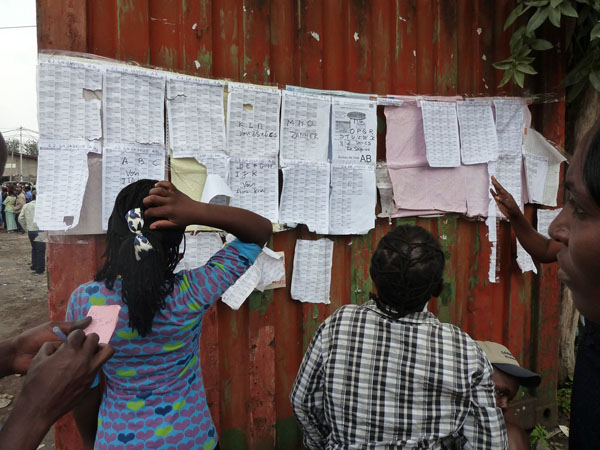
GOMA, Democratic Republic of Congo — The announcement of legislative election results expected this Friday, January 13, may spark renewed ethnic violence in eastern Congo. Allegations of intentional destruction and falsification of ballots in favor of the presidential majority have intensified the already tense electoral climate in North Kivu. Vocal members of ethnic communities and leaders of armed groups have threatened to take matters in their own hands if the electoral commission does not address the allegedly falsified results by the end of the week.
Preliminary results from local compilation centers have been published for most of North Kivu, with the exception of Masisi and Rutshuru, over the last several weeks since the November 28 vote. Out of the 25 seats already announced, only five went to the opposition. In Lubero, for example, the opposition has only won one seat out of eight. A Congolese constitutionalist lawyer and candidate Jean Paul Lumbulumbu Mutanava filed a case of fraud for the territory to the electoral commission, voicing his regret of “ballots hijacking in the compilation center of Musienene/Lumbia (…) and the incident of a $50,000 bribe paid to agents of the electoral commission by a candidate of the COFEDEC political party of the presidential majority.” He told Enough that it was with deep regret and bitterness that his party, the PLD, witnessed massive acts of fraud since the beginning of the election process. “Regarding the compilation process, I cannot understand that out of Lubero’s 938 polling stations only 482 have been compiled.” In addition, the armed group Mayi-Mayi Lafontaine, active in Lubero and Beni, has threatened to use force to “restore the truth of the polls,” as have other Mayi-Mayi groups, according to an influential community leader in Goma.
In volatile Masisi, where Enough and others documented serious electoral problems, the vote count has also been fraudulent. The publication of the preliminary results was postponed over contestations. According to the opposition, political party witnesses were asked by agents of the electoral commission to sign the electoral records early last week despite the fact that the compilation had not been completed. The results had changed overnight, with opposition figures disappearing among the winners to favor the presidential majority parties, the UCP and ADDI. Some of the witnesses Enough spoke with have received death threats for not signing the document.
In a complaint letter to North Kivu’s executive secretary of the electoral commission, dated January 3, 14 political party and independent witnesses denounced the compilation irregularities in Masisi, taking issue in particular with the fact that out of the territory’s 878 polling stations 433 were unlawfully compiled on the compilation suspension day of December 19 and 305 had not been compiled at all. Frustration among Masisi’s natives, the Hunde population, over the loss by all Hunde candidates despite the overwhelming vote for them, as observed by witnesses, has led to clashes with the police in Masisi town late last week. The Bahunde community is preparing to further demonstrate the results. While the electoral commission in Kinshasa has sent an investigative team, which arrived in Goma on January 7, to defuse tensions in Masisi, doubts remain about how much can be achieved before the official count is released.
The Congolese human rights group VSV concluded in its latest publication on January 8 that the irregularities reported are not due to the lack of experience of the Congolese electoral administration, but rather due to deliberate attempts to rig the elections.
“If no solution is found, the produced legitimacy crisis will put the Congolese population at risk of losing confidence in democracy,” VSV wrote. In theory, if it is determined that the irregularities have influenced the outcome of the vote, the Constitutional Court could cancel the vote in whole or in part, as ensured by the electoral law, VSV noted. However, it is unlikely that this will happen given the court’s close association with the president.
Sarah Zingg Wimmer contributed to this post.
Photo: Voters check for their names on a list ahead of the November 28 poll (Enough / Sarah Zingg Wimmer)

